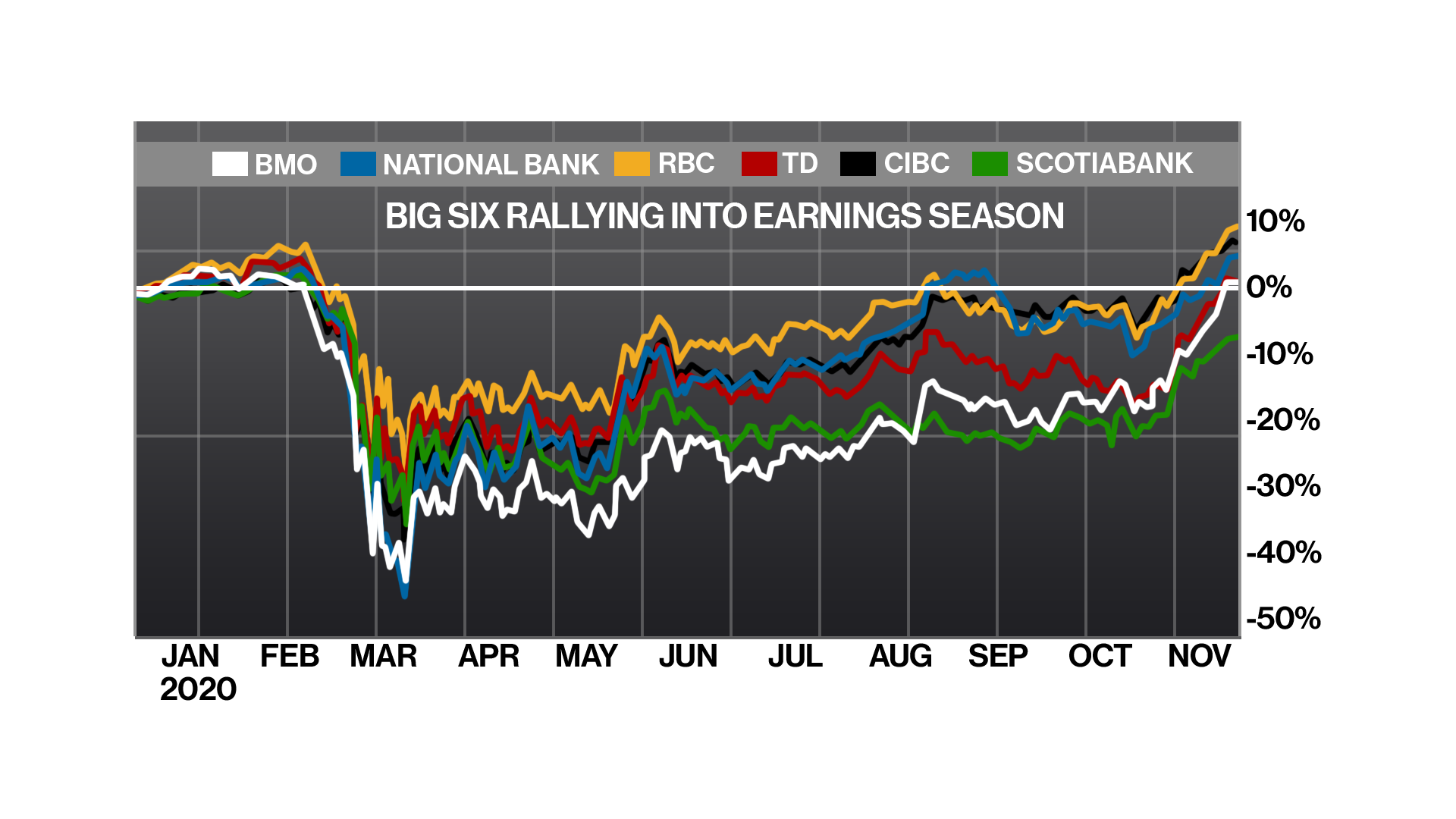Nov 26, 2020
Bay Street eyes dividends, M&A as Big Six banks close 2020
By Noah Zivitz
Banks' credit quality in focus as BMO, Scotia to report Q4 earnings
Canada's largest banks head into the final reporting season of their fiscal year riding a wave of momentum that's seen their shares outperform the broader index this month. And while analysts are expecting another round of double-digit declines in profit, many of them see hope on the horizon, and are even starting to wonder about the day when dividends will rise again.
Credit quality has been the theme to watch since the onset of COVID-19 amid concern the pandemic could unleash an avalanche of loan defaults. Indeed, the banks added a combined $10.9 billion in provisions for credit losses (PCLs) in their fiscal second quarter, which wrapped up in April.
Each of the Big Six lenders other than Bank of Nova Scotia put aside less provisions sequentially in the fiscal third quarter. Credit Suisse Analyst Mike Rizvanovic is among those anticipating more of the same in the fiscal fourth quarter. In a recent report to clients, he estimated provisions for the Big Six will drop 21 per cent on a quarter-over-quarter basis to $5.34 billion. That prediction is based on an expectation Bank of Montreal, Bank of Nova Scotia and Toronto-Dominion Bank will each set aside far less cash for loans that could go bad.
Rizvanovic also told clients when he upgraded National Bank of Canada to "Outperform" on Nov. 23 that his brighter view of the stock was partly based on a belief that the Montreal lender's "more conservative reserving since the onset of the pandemic...gives National a higher likelihood of reversals in economic recovery."
For the Big Six as a whole, Rizvanovic is expecting a 16 per cent year-over-year drop in adjusted profit per share. He sees Royal Bank of Canada as facing the most marginal profit erosion with a five per cent decline, while he estimates Scotia's adjusted profit will sink 33 per cent from the same time last year amid risks associated with its international operations.
Aside from credit quality, here's some of what BNN Bloomberg and Bay Street will be watching when earnings season starts on Tuesday.
'KITCHEN SINK'
Barry Schwartz, the executive vice-president and chief investment officer of Toronto-based Baskin Wealth Management, has some words of warning for investors: expect the unexpected. "You never know what can happen because Q4 can sometimes be the kitchen sink: throw in all the expenses and stuff that you want to throw away at the end of the year," he said in an appearance on Market Call on Wednesday.
"Given that it’s been a tough year, obviously to the say the least for the banks, it could be a little bit wonky. However, I think brighter days are ahead for the Canadian banks and you can see the stock market has already figured that out."
Schwartz said his team at Baskin likes National, TD and Royal, while BMO "isn't [their] favourite." Schwartz holds shares in each of the Big Six banks for clients and owns National personally.
DIVIDENDS
Nobody is calling for dividends to rise next week for a very simple reason: the banks are still on a timeout from lifting their payouts - or buying back shares – due to restrictions announced by the Office of the Superintendent of Financial Institutions early in the pandemic.
But that's not stopping analysts from crunching the numbers on which lenders are best positioned to reward shareholders whenever OSFI unshackles the banks.
"While we do not explicitly model any share repurchases or dividend increases in our estimates, we suspect OSFI will re-evaluate its moratorium in 2021 as uncertainty around the path of the recovery begins to wane and banks continue to build excessive capital buffers," wrote TD Securities Analyst Mario Mendonca in a Nov. 23 report for clients.
CIBC Analyst Paul Holden echoed that sentiment and said OSFI may step out of the way early in 2021 amid COVID-19 vaccine distribution. Holden noted TD, BMO and RBC are "best positioned in terms of capital" and specifically cited the latter as being "in a good position to raise its dividend to match organic growth" whenever it’s allowed to do so.
Remarks this week from the head of OSFI may serve as a deterrent, however, for anyone holding their breath on dividends.

"The most important consideration [for when rules will be relaxed] will be the extent of uncertainty about the economic outlook," said Jeremy Rudin, OSFI's superintendent, in a Nov. 23 speech. "This means that there is no set date nor specific economic indicator that will trigger our decision. We’ll begin to relax those restrictions when we get to the point where we think that there are few if any plausible paths that lead to a second pandemic-induced setback for the economy.
"In that regard, it is important to understand that, from our perspective, keeping the restrictions on a bit too long is not as serious a mistake as taking them off too soon."
As for the concerns earlier this year that dividends could be at risk, that fear was never realized as the country’s largest banks maintained their payouts throughout the crisis. Canaccord Genuity Analyst Scott Chan recently told clients that trend will remain in tact. "Current dividends remain safe and are further supported by our fiscal 2021 average payout ratio of 54 per cent," he wrote in a report to clients this week. "With a low rate environment, we believe the Big Six banks' dividend yields (average of 4.7 per cent) provides near-term share support."
- Canadian banks have good tailwinds ahead: Richard Fogler
- OSFI in no rush to lift Canadian dividend restrictions
- Barry Schwartz discusses Canadian banks
RELATED
M&A
CIBC's Paul Holden, who anticipates adjusted fiscal-fourth quarter profit will drop an average of 18.8 per cent year-over-year for the Big Six, believes BMO and TD will be at the forefront of deal activity.
In the case of BMO, Holden reckons the bank could look to a decade-old takeover as the model for its next move.
"BMO acquired M&I Bank in 2010, shortly after the financial crisis had passed and at a time when U.S. bank multiples were still low. That well-timed acquisition benefited BMO over the course of the following economic expansion. We could see BMO repeat this playbook, particularly were it to execute on a sale of its global asset management business, adding further scale to its U.S. commercial franchise at a time when loan growth is accelerating would be a positive move," Holden told clients in a Nov. 18 report.
He also said TD has "valuable currency" in its 13-per-cent ownership stake in Schwab and circled back to the on-again, off-again speculation that TD could go hunting for a deal among regional U.S. lenders.
"A sale of its Schwab stake combined with excess internal capital could pay for a good sized U.S. regional bank transaction, resulting in high single-digit to low double-digit earnings per share accretion," Holden wrote. "We think this is a compelling opportunity for TD and one where we would want to see execution while valuations on U.S. regional banks remain low."



